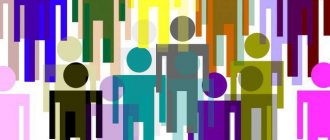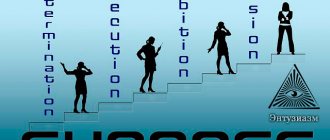Hello, dear readers of the KtoNaNovenkogo.ru blog. Such a quality of character as humanity in modern society manifests itself, unfortunately, less and less often.
It becomes unprofitable to be kind and sympathetic: they will perceive you as weak and spineless, they will take advantage of this and sit on your neck. There is an explanation for this - a decline in public morality, but that is not what we are talking about now.
What is humanity: what are its signs, who can be called a humane person is the topic of this article.
Definition
The meaning of the word humanity can be revealed through the concept of philanthropy, which is understood as the desire of an individual to have a positive impact on the lives of other people, to show care for them. Humane attitude towards others is based on respect, the ability to notice and appreciate the merits of people. Humanism and kindness are synonymous with this term.
Humanity in relationships with people gives rise to positive interaction. An individual with a humane orientation is in harmony with himself and with the world, he receives moral satisfaction. Mandatory components of such an attitude towards people are kindness and respect.
Manifestation of humanity
In philosophy, humanity means a humane attitude. Philosophers are convinced that the condition for the formation of such a human attitude towards others is freedom, happiness and the all-round development of the individual.
According to teachers, manifestations of humanity are the result of education. The problem of humanity often becomes the subject of study by practicing teachers interested in improving the quality of the educational process, since a humane attitude towards people is the key to the successful socialization of an individual.
The concept of humanity is associated with virtue and human dignity. It manifests itself in direct interaction between people.
Humanity and humanity
It is believed that concepts such as humanity and humanity are synonymous. However, this is not the same thing.
Humanity is a conscious component of a person’s moral behavior. This behavior is not innate and does not develop on its own. For its formation in a child, special influences from an adult and an analysis of the child’s actions are necessary.
Humanity is the individual’s comprehensive love for society, respect for people. Humanistic behavior is demonstrated not only by individuals, but by entire states, helping each other in difficult situations.
Character traits that make up humanity
Humanity is spoken of when the following traits are noted in an individual’s character:
- desire to find justice;
- respect for others, politeness;
- humanity, rejection of cruelty and rudeness;
- honesty and sincerity;
- kindness and friendly attitude;
- responsiveness;
- modesty;
- culture;
- the ability to empathize and show sympathy;
- mercy, readiness to help in a critical situation;
- self-sacrifice, dedication;
- altruism;
- unselfishness;
- good manners, high moral level;
- tolerance, patience, forbearance;
- the ability to forgive the mistakes of comrades;
- true interest in people, their problems, confidential communication;
- openness;
- generosity, nobility.
Essay on: “Humanity: Arguments
Those students who write essays on this topic can use the following arguments in their work. Firstly, it can be argued that humanity is always related to morality; Secondly, as already mentioned, this quality always includes the ability to sympathize. Moreover, one who is humane is tolerant of others who are different from him.
See also: GENEALOGY - what is it. Functions and methods of genealogy
Humanity
What is humanity?
Examples of humanity and its manifestations can be found in the actions of an individual, in his attitude to life. If a person knows how to be humane, then this quality is expressed in the following points:
- a clear understanding of one’s own mission in this world;
- rejection of arrogance;
- developed willpower;
- willingness to sacrifice one’s own interests for the sake of the interests of loved ones or even the entire state;
- a person’s desire to help those in need, to support those who find themselves in difficult life situations;
- respectful communication with different categories of people;
A close-knit team based on children’s acceptance of each other
- the ability to understand a person’s point of view, to accept him as he is;
- understanding the weaknesses, inclinations and needs of a particular communication partner;
- taking part in group activities while maintaining respectful communication;
- a highly moral attitude towards people and their needs;
- absence of selfish lines in behavior;
- the ability to tactfully reprimand a boor;
- caring attitude towards animals;
- the ability to make the right choice and resist temptations.
All manifestations of humanity in humans are aimed at making this world a better place. Of course, a humane individual begins all transformations on a global scale with himself. The main theme of his life is spiritual purity and constant self-improvement.
1.5. It is also necessary to dwell in more detail on Marxist (socialist) humanism.
According to Marxist theory, humanism is a worldview that recognizes the highest value of man, his dignity, goodness, and free harmonious development. Humanistic ideas as a system of views originated in the 14th – 15th centuries, gaining significant distribution and development during the Renaissance and bourgeois revolutions of the 17th – early 19th centuries in the “struggle of progressive forces against feudal class oppression and the spiritual dictatorship of the church.”
In Marxist theory, the so-called proletarian
,
socialist humanism
, which is said to represent "a qualitatively new leap in the development of humanism", the result of a "critical reworking of the humanistic ideas of the past."
The peculiarity of socialist humanism lies in its partisanship, class (initially, proletarian) character, highlighting the interests of the working masses, which are opposed to the interests of the “oppressors” and, ultimately, “bourgeois pseudo-humanism with anti-communist content.”
As stated in Marxist theory, the measure of the humanity of human actions is the extent to which they, in practice, contribute to solving urgent problems of social progress, “the liberation of the working individual,” and the creation of a socialist and communist society.
Distinctive features of Marxist humanism:
assertion of the “inextricability of connections between individuals and the collective, society”, the unacceptability of “individualism and egoism”;
proclamation of “proletarian, socialist internationalism” in opposition to “nationalism, racism, chauvinism, all manifestations of misanthropy and obscurantism”;
recognition of human labor as the highest value of life, concern for its comprehensive development, for the creation of a “happy life, filled with deep meaning and joyful creativity”;
“optimism, faith in the strength of man, in his ability to do good, to remake the world according to the laws of justice and beauty.”
According to Marxist theory, only the construction of a communist society is capable of solving such great humanistic tasks as the liberation of workers from capitalist exploitation, political oppression, national enslavement, the elimination of want and unemployment of the broad masses, the elimination of the opposition between mental and physical labor, between city and countryside, the eradication lack of rights for women, liberation of the masses from spiritual enslavement.
How humanity is formed
It is necessary to lay the foundations of humanity in a child from childhood. This is the main task of parents. The basics of humanity are formed in the family, when children adopt the humane experience of the older generation. According to psychologists, the sensitive period for the formation of humanity in a child is the age of 3 years, when the child’s desire to be like adults, to do something independently, to take part in “adult” affairs, helping parents, is most clearly manifested.
The success of educational influences is largely determined by whether the parents and immediate family relatives are humane people. A child will learn to treat others like humans only if he sees an example of humanity nearby.
The main methods of developing humanity are simple everyday actions. For example:
- joint reading and subsequent discussion of works of art;
- imposition of reasonable demands on the child by adults, reasoned restrictions on freedom of action;
- educational conversations, analysis of each offense;
- praise for positive actions;
- mutual assistance and mutual assistance;
- developing a desire to help the elderly;
- involving children in family affairs and household responsibilities;
- preservation of family traditions.
However, not only the family influences the development of a humane attitude towards the surrounding reality in a child. Only the foundations of such a worldview are laid in the family. Then, on this basis, teachers at school form humanity in children, studying topics and sections of different disciplines, analyzing examples from life. In addition, the moral component in the personality structure develops through a system of extracurricular and school-wide educational activities, which are implemented by class teachers and teacher organizers during the school year.
Analysis of literary works and writing essays-reasoning schoolchildren develops their ability to analyze the actions of heroes, form their own opinions regarding good and evil. In literature, social studies, and history classes, schoolchildren learn to understand people. They develop socially approved personal qualities. Educational work carried out at school is aimed at creating a graduate of an educational institution who will be able to create a psychologically healthy environment around him and choose the right path in life.
What is humane?
I will repeat the definition of humanity once again (but in a slightly more expanded form) so that, based on it, we can identify the characteristics of a person who could rightfully be called a humanist.
A humane person can be identified by the following three characteristic features :
- Altruism is the desire to help those in need completely free of charge, the tendency to care about others, to provide assistance without asking for anything in return.
A striking example of the manifestation of this quality are people engaged in volunteering - activities aimed at helping others as much as possible. This is not done for money, fame or any other bonuses. The intentions of such people come from the heart. This is help for the sake of help. A person with a humanistic view of the world can be a donor, help orphanages, organize free holidays, care for the elderly in nursing homes, treat the wounded in a war zone, and so on. - Morality is a value system built on generosity, kindness (what is that?), acceptance and lack of selfishness. A humane individual is a humane person, raised as such from childhood. If a child has been taught cruelty in various ways and instilled with the idea that the world is dangerous, then it is unlikely that in the future a person will treat him with love.
- Willpower is needed in this case to combat base feelings and desires. The same egoism is present in all people without exception; it is a given, necessary for survival and development. We differ only in the degree of self-love: there are those who never share anything or help anyone, and those who give their last for the benefit of others. Sometimes, in order to do the latter, you have to suffer a fair amount of doubt. A humanist is also a person, he must think at least a little about himself in order to live a full life. If you're down to the last pair of pants, it wouldn't be wise to give the pants to someone who doesn't have them. It's another matter if you have two pants.
Read also: How to make a ponytail if you don’t have an elastic band
If these three elements are not present in a person’s action, then there is no need to talk about humanity.
It often happens that people donate considerable sums to charity (as philanthropists do), and then shout about it on all corners, unless they hang up posters around the city. Such actions are dictated by vanity, and this is self-interest. The desire to help should not be accompanied by the expectation of return or payment for one’s good. Otherwise, this is already a trade relationship.
Where do inhuman people come from?
Examples of humanity in everyday life would not be so noticeable if absolutely all members of society showed a humane attitude towards each other. But reports in the media and what can be seen on the street convince us that inhumanity coexists alongside humanity.
Where do inhuman people come from? The answer is simple: from dysfunctional families, where parents do not pay due attention to the formation of worthy citizens.
Inhuman people appear if:
- in childhood they are subjected to cruel methods of education;
- children witness parental scandals;
- the child observes the disrespectful attitude of parents towards each other;
- they are treated rudely by their peers, such children suffer humiliation from them;
- among their comrades they are outcasts;
- in childhood, the child had a traumatic situation, after which he was not provided with psychological support and assistance.
Inhuman people behave in criminal ways. They get into fights, insult others, and may even commit murder. Their usual activities are barbarism, vandalism, and extremism. They behave this way because they feel the imaginary hostility of the world around them. This happens because in childhood they did not develop confidence in safety and protection. That is why a person who is disliked by his parents and who had a difficult childhood shows aggression towards those who are weaker than him. By demonstrating strength, he seeks to protect himself.
Inhumane attitudes can be directed towards others, animals, cultural or natural objects. People who lack philanthropy assert themselves at the expense of others and compensate for the suffering they suffered in childhood. The personality structure of inhuman people consists of such traits as:
- indifference to the problems of other people;
- low level of culture;
- amoral behavior;
- bitterness;
- greed;
- selfishness;
- gloat;
- envy;
- dishonesty;
- tendency to betray;
- lack of compassion;
- vindictiveness;
- mercilessness, cruelty;
- composure;
- emotional callousness;
- aggressiveness;
- selfishness.
In asocial and dysfunctional families, children do not see examples of humanity and humanity, the moral foundations of the individual are not formed. In such a situation, the educational work of a school or any other educational institution turns out to be ineffective, since a teenager who has not experienced tenderness, affection, love and care will not learn to show them.
Indifference as a form of inhumanity
Indifference as a form of inhumanity
It is a mistake to believe that an emotionally cold person who is not touched by other people's troubles and misfortunes is humane. Of course, it’s not polite to pry into someone else’s life and scatter advice left and right when they’re not asked for. But the lack of desire to alleviate the suffering of the unfortunate person, to share his pain, is also not an example of humanity.
Humanity and social passivity are incompatible. If a person is not interested in what is happening around him, moves away from the team, prefers loneliness to live communication, then he has no opportunity to show humanity. And this social quality must be constantly trained. In the absence of practice, they go out, and the person becomes callous. He is no longer able to sincerely love, make friends and perform sublime deeds.
Indifference devastates an individual and devalues his life. The emptiness in the soul requires filling, so a person is looking for at least some options for filling this emptiness. He has an increased risk of committing antisocial acts, because such an individual is not inclined to experience remorse, shame and guilt.
According to religious views, indifference is a sin. As practice shows, the most terrible crimes are committed with the tacit consent of indifferent individuals to these actions.
Who is a humanist
It’s not difficult to guess who a humanist is. This is an individual who loves a person and humanity as a whole.
Such individuals do not divide others into good and bad, accept them for who they really are, forgive those who have stumbled and give chances for correction, and help those who need it. They cannot remain indifferent to people’s grief, as they have a high level of empathy - they experience other people’s troubles as if they were their own.
Humanists are kind people who know firsthand about mercy and unconditional love, who have a flexible worldview: they do not expect ideality from others, they are able to enter into any situation , understand and accept the not-so-beautiful actions of members of society.
An impartial, maximally objective, non-rigid humanist is, first of all, a creative person.
After all, there are no frameworks for him, he is spontaneous, not tied to “good” and “bad”, stereotypes and conventions imposed by society. Thanks to internal freedom, he is free externally and therefore constantly receives different life experiences, developing spiritually and physically.
The Benefits of Humanity
Every person, having reached conscious age, has the opportunity to choose what to do. The obvious advantages of humanity are:
- gaining peace of mind and positive self-perception;
- awareness of one's own strength, pride in one's achievements;
- finding your place in life, in the team;
- the joy of being useful to someone;
- development of willpower, tolerance;
- the opportunity to gain recognition among team members;
- maintaining friendly relations with superiors and colleagues;
- achieving harmonious relationships in the family;
- love and understanding from others.
Asya Rakhovich
Psychologist with more than 8 years of experience. Consultant on interpersonal and marital relationships, self-discovery.
Ask a Question
Problems of humanity
Humanity is a social phenomenon. Sociologists have identified the main problems of humanity:
- the nature of humanity is not fully understood. As practice shows, it is not possible to develop this personality quality in all people. Based on this, scientists make assumptions about the biological nature of humanity. If this quality is innate, is it worth the effort to artificially recreate it?
- In real life conditions, this personality trait does not always manifest itself naturally and consistently. This is due to the fact that even sincere people tend to expect gratitude and approval for their actions. But it’s not always possible to get them. A person who needs help and care sometimes does not have the personal resource to express gratitude. Without taking this into account, the person who has done good becomes disappointed in it. Probably, the next time he is faced with a moral choice, he will refuse to show humanism.
- In the modern world there are many synonymous concepts. Thus, the terms “kindness”, “humanism”, “humaneness”, “mercy”, “humanity” are close in meaning. But at the same time, their content is different. Each of these concepts has its own nuances. As a result, individual ideas of parents and teachers about what should be understood as philanthropy vary greatly. This leads to the fact that the efforts of socialization agents do not have a clearly defined direction. Everyone is trying to form a worthy citizen, without having an unambiguous clear model of the desired result.
- Today there are no valid psychological and pedagogical tools that would allow us to obtain reliable information about the level of humanity of a particular subject. There are methods aimed at studying the degree of expression of one or another component of humanity (level of education, for example). But based on the results of these techniques, it is not possible to form a clear idea of what level of humanity a particular subject has.
- Some people equate philanthropy and goodwill with mental weakness. They believe that in the modern world it is unprofitable to be humane. By showing a humane attitude towards others, a person risks his own safety and his wealth. The stereotype is firmly rooted in the public consciousness that by showing a humane attitude towards others, a person risks his own safety. If parents have such an attitude towards humanity, will they consciously train this quality in their children?
- The task of maintaining personal boundaries and the boundaries of another person becomes an urgent problem in the manifestation of humanity. Situations often occur in life when well-mannered people prefer not to interfere in a particular situation that requires a moral choice, because they are afraid of seeming intrusive or overly curious. However, if you think about it, the risk of seeming too intrusive should be less scary than the risk of being considered indifferent.
The difficult path of self-development
Humanity Humane
Humanity as a quality of personality is
the presence of a clearly manifested system of social attitudes of the individual, which is represented in the mind by experiences of compassion and rejoicing and is realized within the framework of communication, assistance, complicity, assistance with everything living and “natural”, which has a deep personal meaning for the subject.
Once in Africa, during a sacred holiday, jackals attacked a family of antelopes and tore them to pieces. This serious crime was previously punishable by death, but by decision of the community they were put in a hole for life, showing humanity and mercy. The peace-loving zebras said: “We are all of the same blood.” It is a great sin to kill your own kind. None of us has the right to take their lives. It is more humane to leave them alive, let them sit in prison for the rest of their lives and repent. The armadillo objected: “They committed a serious crime by demonstrating their animal instincts!” This pack of jackals challenged the entire community. By leaving them alive, we insult the feelings of the surviving antelopes, the children who were left without parents. This resentment and indignation for an unfair verdict will over time increase hatred and anger in society. Jackals lack remorse and therefore deserve only the death penalty. Although the armadillo’s words sounded convincing, Lev agreed with the opinion of the zebras, and left the condemned for life in the pit. And it so happened that after some time the jackals managed to escape from the pit, killing the guards and random witnesses. The lions caught them again and threw them into a hole until the community decided. And this time the humane zebras said: “We have no right to take their lives.” We didn’t give it to them and it’s not us who take their lives away. And the community again took the side of the zebras. The lion looked at the upset armadillo and asked him: “What do you think about this situation and the community’s decision?” “I think that either common sense will save our world, or your hypertrophied humanity will destroy it.”
Humanity, if it is excessive, can be poisoned. Undoubted virtue in the modern world turns into cruelty towards innocent people who have become victims of executioners, forgiven by society. Probably, today the Nuremberg trials would never take place. Current humanism is mutating into an orgy of permissiveness, double standards, hypocrisy and self-deception of humanity. Today's humanism will undoubtedly outlive humanity.
Norwegian terrorist Anders Breivik attacked a youth camp in July 2011 and killed 77 people and injured 151. He was found sane and sentenced to 21 years in prison. Breivik is kept in a solitary cell measuring 80 square meters and consisting of three rooms: a bedroom, an office and a gym. He has the ability to correspond. The terrorist can also walk in the courtyard under the supervision of security. On November 9, 2012, Anders Breivik sent a 27-page letter to employees of the Norwegian penitentiary service, in which he complained about prison life. Breivik does not like the attitude of the prison guards, the rubber handle that rubs his hand with prolonged use, the forced shave and brush his teeth under the supervision of guards. Breivik notes that they bring him cold food and butter, which, according to the terrorist, “is impossible to spread on bread.” In general, Breivik called the conditions in prison “sadistic.”
To preachers of such excessive humanism, read – cruelty towards victims, I advise you to listen to the words of Mikhail Genin: “If you want to hug the whole world, buy a globe.” Alexander Dragilev spoke quite clearly about humanism, which puts mercy above justice: “If there is a God, then He is higher than us. This means that He looks at our actions. If He created us, it means that in addition to our goal, we also have a goal in His understanding. He created us for something, which means that in His head, in His mind, some purpose is prepared for us. Accordingly, to follow this purpose that He invented for us is good, good, good. And to resist our purpose, for which He created us, is evil. This puts us in a certain framework, in the framework of good and evil. When we say that man is the crown of nature’s creation, we sweep away the boundaries of good and evil. We say: “Everything that is good for a person is an absolute good - good in general!” Whatever is good for Caesar is good for me. This is where this religion comes from. It's called humanism. Humanism is a religion that places man on the pedestal of God. We worship man. We worship a humanoid. Such is religion. Everything that is good for a person is good.”
Humane, according to V. Dahl, means humane, humane, human (to act or do humanly, well), characteristic of a truly enlightened person, merciful, merciful. The measure of humanistic values is “humanity” and “inhumanity”. Everything that corresponds or does not contradict the criterion of humanity becomes the value of humanism as a worldview and way of life. The antonym of humanity is cruelty, that is, in the narrow sense, humanity is the desire not to cause suffering to a person as much as possible.
In a vital and psychological sense, humanity as a quality and essential property of a person includes: altruism (kindness); morality as a set of life rules of behavior that implement altruism and suppress egoism; will, as a spiritual force that realizes altruistic and moral behavior in the fight against one’s own and others’ egoism.
Humanity as a quality of a person is closely related to another quality - altruism, which is understood as a tendency to disinterestedly care for the well-being of others and a willingness to sacrifice one’s personal interests for others. The criterion of providing assistance on a disinterested basis, that is, without selfish interests, serves as a determining factor for all forms of manifestation of humanity. Any form of support, sympathy, compassion or help that comes from the expectation of approval or receiving some benefits cannot be considered a manifestation of true humanity. For example, large donations to a charity made for reasons of vanity or advertising are not considered humanitarian. A pious, humane act must be selfless. This is the basic requirement.
It is difficult to identify the line between a selfless and a selfish act from the outside. This can only be done by the person himself, having analyzed the origins of his behavior. Often behind the disinterested and completely indiscriminate provision of help lies a selfish motive associated with internal self-affirmation, or relieving stress and avoiding feelings of guilt.
Biographer A. Lincoln F. Sharp illustrates this with the following story. Once, traveling in a carriage and talking with his companions, A. Lincoln, “after ... had argued in favor of the fact that selfishness pushes one to do all good deeds, ... noticed that the pig, passing by as Once a carriage passed, it made a terrible noise. Her piglets fell into the pond and drowned. Lincoln asked the coachman to stop, jumped out of the carriage, rushed to the pond and pulled out the piglets. As he resumed his seat in the carriage, his companion remarked, “Well, Abe, tell me, what does selfishness have to do with what just happened?” “Oh, God bless you, Ed, it’s the most direct thing. I wouldn't be able to calm down all day if I drove by and left the poor pig worrying about her little ones. I did this to calm down. Don’t you understand this?”
A truly humane attitude in a number of cases has a strong positive impact, both on individuals and on entire groups. We find a striking example of this kind in the famous novel by G. Senkvich “Kamo Gryadeshi”. The Roman tribune Marcus Vinicius writes in a letter to a friend: “When I ... returned to my place, no one was waiting for me at home. They thought I was in Benevente and would not return soon, so I found chaos, drunken slaves at the feast they had arranged for themselves in my triclinium. I appeared unexpectedly, like sudden death, and perhaps they would have been less afraid of her. You know, I lead the house with a firm hand, and everyone, as one, fell to their knees, some lost consciousness from fear. And do you know what I did? At first I wanted to demand rods and hot iron, but then shame overwhelmed me and - do you believe it? - pity for these unfortunates; Among them there are also old slaves, whom my grandfather M. Vinicius brought from the banks of the Rhine in the time of Augustus. I locked myself in the library and there I had even stranger thoughts, namely: after what I heard and saw among Christians, it is not appropriate for me to treat slaves as before, they are people too. And my servants were in mortal anxiety for several days - they thought that I was delaying in order to come up with a more severe punishment, but I never punished them - because I could not! On the third day he called them all together and said: “I forgive you, and you try to atone for your guilt through diligent service.” They threw themselves on their knees, shedding tears, stretching out their hands to me with cries, calling me lord and father, so that I—I tell you this with shame—was also moved. ... As for my servants, one thing surprised me. The forgiveness they received not only did not arouse insolence in them and did not shake their obedience, but on the contrary, fear never forced them to serve as diligently as gratitude did.”
Petr Kovalev Other articles by the author: https://www.podskazki.info/karta-statej/
How to develop humanity in yourself
It was said above that his family plays a large role in the development of an individual’s philanthropy. But this does not mean that a person from a dysfunctional family will not be able to consciously form an exalted attitude towards others.
To develop humanity in yourself, you need:
- Find in your immediate or distant social environment a person who could be considered a model of mercy. To organize your own life in accordance with the principles of humanity, you need to surround yourself with friendly people.
- The development of humanity is promoted by participation in the volunteer movement. Selfless help to those in need awakens in the depths of an individual’s soul true love for people and respect for their feelings.
- When communicating with friends, it is important to learn to listen rather than talk. Often, it is with sincere help to friends that a person’s path to God begins.
- A person who has decided to treat others nobly and help those in need free of charge needs to develop the right attitude towards gratitude. Of course, everyone is pleased to receive gratitude for a good deed, but this should not be an end in itself. You should not make hasty conclusions about a person if he has not thanked his savior.
- It is important to learn to forgive people who once hurt you and let go of grievances. Rancor and resentment are character traits that need to be corrected. The reason for their appearance is unprocessed negative emotions. If you can’t let go of destructive feelings on your own, you need to seek help from a psychologist.
- Humanity consists of such components as intelligence, kindness and love. This means that you need to learn to treat people humanely by reading books on philosophy, pedagogy, and psychology. It is also necessary to look at the world kindly, learn to notice the good in people, and not focus on the bad. To love the world and the people in it, you need to love yourself. It has to do with self-acceptance. A qualified psychologist will help you do this.
- Only a critical attitude towards one’s own actions will help a person learn to distinguish good from evil. Of course, the intention to become humane is not enough to radically change your life. Personal transformation is a long process. Keeping a diary can facilitate the transition from a habitual pattern of behavior to philanthropy. It should describe and analyze in detail situations of moral choice and one’s own behavior in them.
Continuity principle
A person’s humanity is formed through a continuous educational process. It is determined by many factors and is considered a multifaceted phenomenon, not limited by time or age. Education begins from the moment a person is born and continues throughout life.
The personality and its qualities are influenced to varying degrees by the social environment and natural conditions. Education is carried out not only in the process of educational activities, but also in extracurricular activities.
Some parents believe that a child is brought up only in cases where certain conversations are held with him, and the work of teachers in preschool institutions and educational institutions is carried out.
But Makarenko said that the most important aspect of continuous education is the family. The older generation must take responsibility through various institutions: preschool institutions, family, vocational educational institutions, and purposefully take care of the humanization of the younger generation.
Examples of humanity from life
Examples of humanity in life include:
- heroic deeds of border guards;
- activities of charitable foundations;
- the selfless fight of doctors for human life;
- volunteer assistance from schoolchildren to the elderly;
- donation;
- a sincere desire to take part in the lives of loved ones, asking them: “What happened? Maybe you need help?
Volunteer activities











